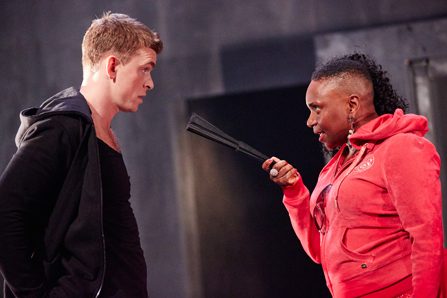
Nurse played by Anita Reynolds
Romeo played by Chris Gordon
Photograph Credit Mark Douet
The production of Romeo and Juliet at Sherman Cymru was exciting and fun, as an audience member I couldn’t wait to see what would happen next. The actors portrayed their characters in a realistic and comprehensible way. Even though the play was in Shakespearean English, I knew what was happening because of how the actors performed their roles, and their facial expressions. Throughout the whole play each actor stayed in character, and not once slipped up. During the Capulet’s party, I kept diverting my attention from Romeo and Juliet to see what the other characters were doing, and each one of them was doing something. Whether it be dancing or having a drink, they were never just there.
I really loved the fact that the Sherman modernized the play. The costumes and music were not from fourteenth/fifteenth century, but were from the twenty first century, which gave the play a really unique twist. The music really added something to the play, and made it much more entertaining for the younger audience.
The set was one of the best aspects of the whole play. The set designer, Kenny Miller, obviously had put a lot of thought into it. At the beginning when I saw the stage I wondered how they would show the balcony scene between Romeo and Juliet, I mean there wasn’t a balcony anywhere in sight. Well, I was absolutely amazed by how the balcony was revealed to be behind, what I thought was, just a street wall covered with posters. Absolutely amazing! The set had been so carefully designed and you could see that from the start. I loved how the Capulet’s mausoleum was right at the front, but also kind of unnoticeable until right at the end. The detail in the set design really blew my mind and I cannot begin to imagine how much time was put into creating it.
Whilst studying the play in school I didn’t really pay attention to characters such as Benvolio and Mercuito, they were just side characters. This production completely changed my mind. If it were not for those characters the play would not be nearly as excellent as it was. The actors who portrayed Benvolio Linden Walcott-Burton and Mercuito Scott Reid were incredible. I cannot believe that I hadn’t given them a second thought before. Benvolio was such a strong character. No head-turn, hand-gesture or line was unimportant. I was entranced as I watched him. I don’t cry at plays, but as I watched Mercuito die, tears came to my eyes. It was so realistic and believable! Scott Reid is a phenomenal actor and I would love to see him in other productions.
There are no words to describe how much I loved the Nurse played by Anita Reynolds. Her pink tracksuit, hairstyle and sassy persona had me enthralled every time she was on stage. I found myself just staring at the Nurse even when she wasn’t speaking, just to see the eye-roll I knew was coming.
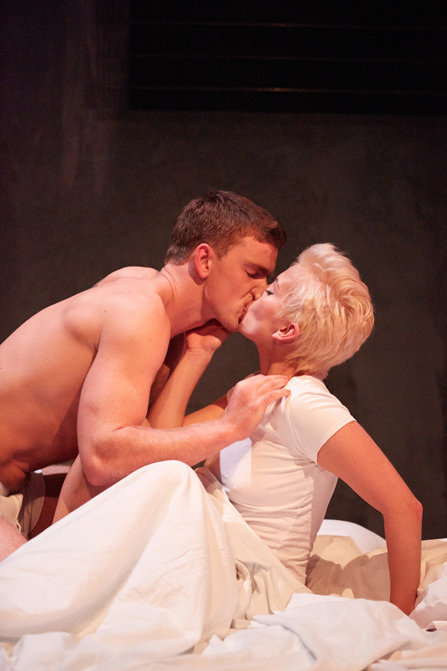
Romeo played by Chris Gordon
Juliet played by Sophie Melville
Photograph Credit Mark Douet
The love and angst between Romeo played by Chris Gordon and Juliet played by Sophie Melville was portrayed perfectly! I could not fault the actors at all. I love how Romeo was dressed and how Juliet was a typical teenage girl. It just added to the play and made it easier to understand.
I absolutely loved the production of Romeo and Juliet directed by Rachel O’Riordan at the Sherman Theatre. It was unbelievable! The set and music were brilliant! Each character was portrayed fantastically and I would love to see the play over and over again. If I had to choose between watching the 1996 film version of Romeo and Juliet with Leonardo DiCaprio and The Sherman Theatres version, I would pick the Sherman’s version without a second thought.
Category Archives: Theatre
Review of Romeo and Juliet Sherman Cymru by Amina Elmi
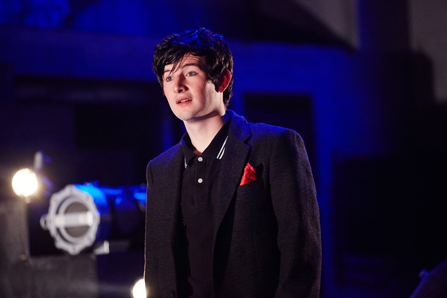
Scott as Reid Mercutio
Photo credit: Mark Douet
When I thought of Romeo and Juliet, I used to think about pointless deaths and nauseating romance. That all changed when I went to see the Sherman Theatre’s production of Romeo and Juliet directed by Rachel O’Riordan on October 3rd.
One of things I will not be forgetting about anytime soon are the costumes. The characters in the play were dressed in modern clothing, that wasn’t much different to what my friends and I wear. The costumes and the music created a modern feel to the play that the audience and I could connect to.
My favourite scene had to be during the Capulet party. Romeo played by Chris Gordon and Juliet played by Sophie Melville were in a passionate embrace, but what really caught my eye was how the characters in the background danced in time to the music. It was very subtle, but extremely effective.
My favourite performance was the solid acting from Mercutio played by Scott Reid. I loved how he was bold and demonstrated the bromance between himself and Romeo perfectly. His most powerful scene was when he was killed by Tybalt played by Luke Eliott Bridgeman and yelled “A curse on both your houses” As an audience member I sympathised with his character who got caught up in a feud that ultimately led to his untimely death.
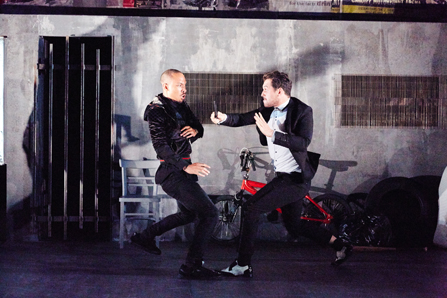
LukeElliot Bridgeman as Tybalt
Linden Walcott-Burton as Benvolio
Photo credit: Mark Douet
I’m not a fan of romance normally, but the chemistry between Romeo and Juliet was as clear as day. Their forbidden love caused by their families mutual hatred was heart wrenching. During their final scene when Juliet plunged the weapon into her side, a small part of me prayed that they would reunite in a fictional afterlife.
I really enjoyed the production of Romeo and Juliet and recommended it to all my friends, I do the same to you.
Review Romeo and Juliet, Sherman Cymru by Sian Thomas
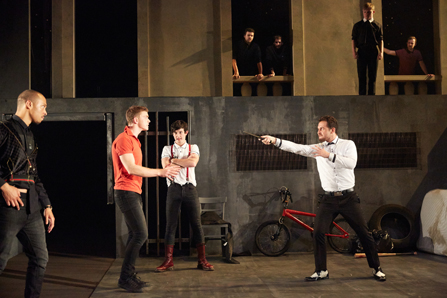
Seeing Romeo and Juliet at the Sherman Theatre on the third of October changed my perspective on the play completely, I have studied the play for coursework in year nine and ten and I couldn’t have hated a play more than I hated this one, it absolutely did my head in! The language was pretty difficult for me to grasp and use for evidence in my essays, but after seeing it on stage, I wanted to go back in time and tell myself to hold on, and not judge it rashly. I’m not an expert on Shakespearean English, but the way the actors portrayed their characters in time with their lines made everything so much clearer and much more enjoyable.
My favourite character in this play was Mercutio, who was played by Scott Reid. When I was doing the play in school, I didn’t really know much about any character I didn’t have to write a lengthy essay about, (I wasn’t really supposed to focus on anyone else) so seeing him as a bubbly and loveable character really was a nice change of scenery from two star-crossed lovers and their angst. Reid was phenomenal in this role, because he could use the space around in really interesting ways, I don’t think I ever saw him not using his hands or being completely still! (Unless he had to, during that one particular part in the party scene in the Capulet’s’ manor.) to me, personally, this is a sign of an actor who definitely knows what they are doing on stage. My drama teacher often says for us to “never just stand there” – always do something, even if it’s little – It was never boring to see him excitedly moving about! It even made me want to join in! His facial expressions when his character had been stabbed made me feel the pain he must have been feeling, and it made me want to jump up and reassure him. I remember that he pulled the coat he was wearing around him as he did this, which made my feelings of wanting to help practically double. When studying the play in school, I wasn’t swayed by him dying, but when I saw it on stage after noting all of this, I wished it hadn’t happened at all. I adored the fact that many actors had an accent. I loved that Mercutio had a Scottish accent, as it seemed to maximise his bubbly and fun personality.
I particularly loved the modernised representation of certain characters such as the Nurse and the servant, Peter. They went from simple servants to someone who you could just tell had been angry to have been cut off, from rather bland to sassy and likeable . Every hip-swish and hand gesture was amazing and I’ll never forget them.
I loved the clothes that everyone wore especially the Nurse and Lady Capulet’s costumes. The pink tracksuit the Nurse wore (along with her fantastic accent) made me grin every time she appeared. A pink tracksuit like that was so much more enjoyable to see than a maid’s outfit! Lady Capulet’s costumes were great, too! I loved that in the very beginning fight scene she tried to use her high heel as a weapon! Her costumes especially in the party scene one was a lot more exciting than a corset and a dress with a thousand layers to it!
I loved the music that was played between and during scenes. The party scene at the Capulet’s’ was absolutely top, with a very infectious beat, I couldn’t help bobbing along with the characters. I don’t know the names of the tracks of the songs used, if I did, they’d be sitting in a playlist on my iPod labeled “Fab Romeo and Juliet tracks!!” Dubstep in a Shakespearean play? Loved it!
The set designed by Kenny Miller was outstanding! The modern posters and newspapers, which had been put up, and stripped/ripped down made the set really look like a modern street, which was fantastic for the street brawls! I loved the almost-jail-cell, which doubled as a coat wardrobe. It made me smile. It looked so interesting amidst the rest of the set. The air of mystery was thick and fantastic with that thrown in the mix as well as everything else. I dare to think how much effort was put into creating it and how long it must have taken. I didn’t even expect the top to lift up and reveal a balcony set. (Even though I should have known about it! I studied the play!).
I loved the play and the direction by Rachel O’Riordan, if I could see it again and again I would be very happy. Every character was loveable in their own unique way and each and every single one touched my heart and left a mark there I’ll never forget. The way the cast performed made it a masterpiece; I’ll never forget Romeo and Juliet at the Sherman Theatre.
Review The Commitments Palace Theatre, London by Hannah Goslin
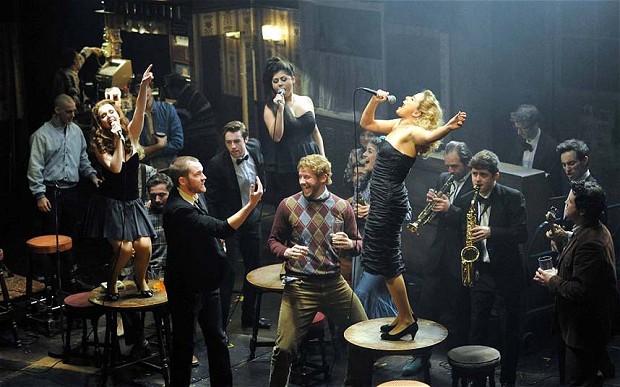
The Commitments
Palace Theatre, London
05/10/14
The intimate and ornate setting of the Palace Theatre in itself was a great experience. Picking seats close to the action, I felt it was a perfect place for The Commitments. A story about a group of working class North side Dubliners trying to hit the big time with a make shift band – my seats allowing me to look up in awe at the action.
Set in the 80’s, even the relatively young in the audience would be able to relate to the stereotypical costuming with large mullet-ed hair and velvet ruffles in abundance. To complement this, the songs that are either in full performance or even snippets of are well-known and repeated by the audience – a real concert style atmosphere begins.
As a regular visitor to Dublin with close Irish friends, many of the references to the ‘North Side’ and the prominence of U2 during this era with the dislike of this fact, tickled a funny bone. I wondered if all of those who had come into this performance would have understood the gags and puns as well as others.
The actors themselves were very inspiring. With Dublin accents and enlisting the same amount of professionalism as one would expect from a continuous running show. Despite this, the performance seemed new and fresh; not expectant of a performance which would have been shown a mere hours before. General movements and speech in the background, interaction with one another and the set was constant and almost naturalistic in such an exaggeration of comedy; showing the subtle skills that these actors are capable of. Such a talented group of performers – not only do their acting abilities rival many of this genre in the West End, but their singing and musical abilities are also top-notch, giving something very special and unique to this show.
Ending on a high is an understatement. The Palace Theatre was turned into a concert, leaving you forgetting that this is a written play; with little bits of improvisation, along with a borderline of acting versus personality of the actors themselves; This production was wonderful to see as it showed the joy and excitement that the performers themselves have with this production. The standing sing along, clapping and dancing of the audience looking onto this pretence band was a strange but also an endearing ending to a West End musical and brought a great sense of the Irish community to London.
REVIEW: Crazy Gary’s Mobile Disco – Chapter, Cardiff by Sam Pryce
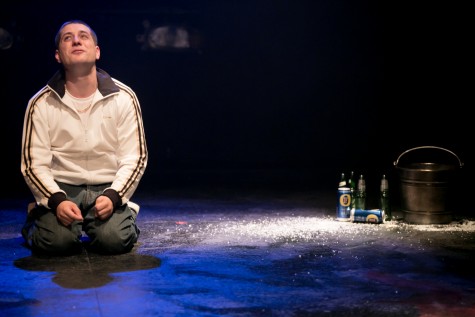
Photo credit Farrow Creative
Welsh playwright Gary Owen wrote this shattering triptych of vulnerable masculinity in 2001. Now, in 2014, it gnaws at the bone just as much. In fact, in this production by Waking Exploits, it may as well snap the bone off completely. Three accomplished actors deliver three similarly brash, shocking monologues in a strange hinterland spattered with empty bottles, shards of glass and a disused karaoke machine – a set designed aptly by Alison Neighbour that subtly reflects the shattered hopes of the characters.
First up is the eponymous Crazy Gary, equipped only with a tracksuit, a swagger and a murderous look in his eye. Gary – who is in no way based on the playwright (as far as I know) – makes sure we know he’s getting laid tonight. After carving an esteemed reputation at school as the bully, Gary now runs a mobile disco at the local pub. And no one gets in the way of his disco night. That’s common knowledge. But, of course, when it comes to the girl of his dreams, we find he’s capable of some ounce of compassion, although violence seems to be his only way of coping. Jordan Bernarde embodies the role brilliantly, conveying the character’s psychopathic hostility as well as his brittle spirit.
Gwydion Rhys then steps up to the mic and warbles us a ballad as Matthew D. Melody, the next in the troubled trio. Karaoke King Matthew, bearing a perturbed stare and a wailing singing voice, tells us of his newfound love Candy, his devotion to God and his unfortunate incident involving the mutilated corpse of a cat.
Finally, Sion Pritchard gives the last and most twisted of the monologues – the one that finally ties the three into a firm and unbreakable knot. Pritchard plays Russell who is desperate to flee the town that has tormented him so. His attention-seeking girlfriend, however, has other ideas and blackmails him into following her rules. Still haunted by a horrific incident from his schooldays – something that links the three men – it seems Russell does not have much choice.
All the characters seem ruled by the women in their lives. Gary’s violent manner is made to seem pathetic when his dream girl snubs him. The girl of Matthew’s affection seems detached and aloof from his desire. Russell too is forced and threatened by his clearly unhinged partner, piling on more guilt on top of what already burdens him. Does this make the play misogynistic? Or rather, is it a feminist text? Since the women clearly have the upper hand here.
Under Matt Ball’s direction, the actors participate in each other’s monologues, voicing minor characters, thus amplifying the connection we eventually discover between them. Although each character has done best to avoid each other for years, something of their spirit lingers. The projected motifs of tearful eyes and bloodied teeth either side of the stage thicken once again the knot that binds them.
It’s not one for the faint-hearted, the narrow-minded nor the easily offended, but it is one for those hard knocks out there who relish Welsh drama. As a play, it adds emotional depth to the stereotype. It’s violent, yes. It’s crass, undoubtedly. But the cruelty is only a front for something tender and helpless. Here is masculinity crying for its mother.
REVIEW Briefs-The Second Coming, London Wonderground
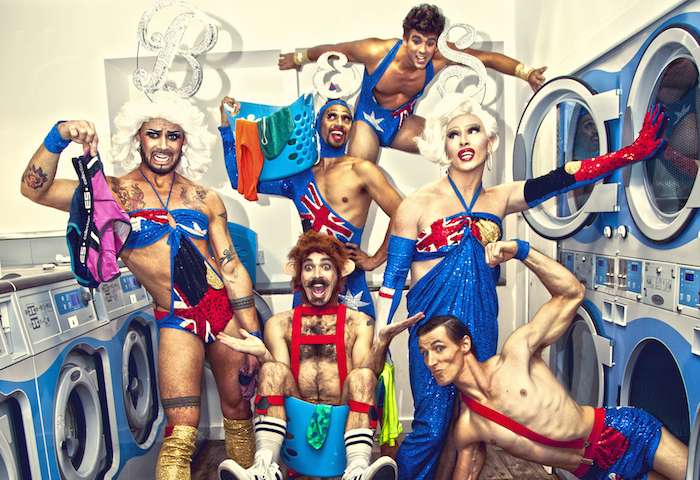
Inside the European Spiegeltent on London’s Southbank, a new world is formed.
This cabaret, fringe style hub hosts a huge supply of performances to see, all different and all spectacular.
London Wonderground introduced me to the Briefs – a circus, cabaret, boylesque drag show from Australia.
As a fan of all these types of performances, I thought I would know what I was heading for, but in reality, I could not have ever guessed !
We were introduced to a host who not only welcomed you to their show, in a friendly and personal manner but also cracked many a joke and innuendo that could only be described as side splitting. Her costumes were ever changing and lived up to the notoriety of drag acts for being stunningly beautiful – from her costume, to her make up, to her on stage persona.
Not one group of performers has ever had so many skills and used them so well together in such a polished show. Dallas DellaForce brought her stunning change of drag acts, lip syncing and changing her personality from a Cher lookalike, to a posh dog owner, to even a boylesque balloon act with a split personality syndrome. Her beauty, charm and fantastic acting skills won over every audience member.
Acts such as a young gentleman able to complete a rubik’s cube in little more than 3 minutes while dressed as a cheeky school boy made everyone astonished and giggle. His skill in as little as yo-yo tricks, while talking about it here may seem tedious, but was in fact awe-inspiring, linking this into a burlesque routine, also divided the audience from the strong to the prude, releasing the naughty but rude nature of the show.
This continued with acts such as a crazed and clown-like monkey character, who used innuendos and phallic inspired jokes to ensure that this show was not for the faint hearted, but definitely for those with a great sense of humour.
Of course, this wasn’t always the aim of the show. Adult content always ticks a box for me in shows such as this, but moments of sheer awe not only gives a break for those who feel a little shocked, but to also gives a moment for your jaw to drop. A flexible and strong male who was able to contort himself, fly high above us in a hoop performing tricks that you could only wish to do left the room in silence, with the occasional ovation and cheer for the fantastic tricks he was able to do.
Finally, to end the show, a fantastic burlesque act. Beginning in an outfit to die for as a beautiful bird of paradise, ending up in a Dita Von Tease style champagne glass of water, and again, a series of acrobatics movements above us, this act was not only verged classic and elegant, but comedic with water splashing everywhere, drenching the poor premium Wondergound seating areas at the front. Who could ever be mad at water-soaked performance when it was executed so perfectly and gracefully!
An insight into the rehearsal process of Sherman Cymru’s Romeo and Juliet
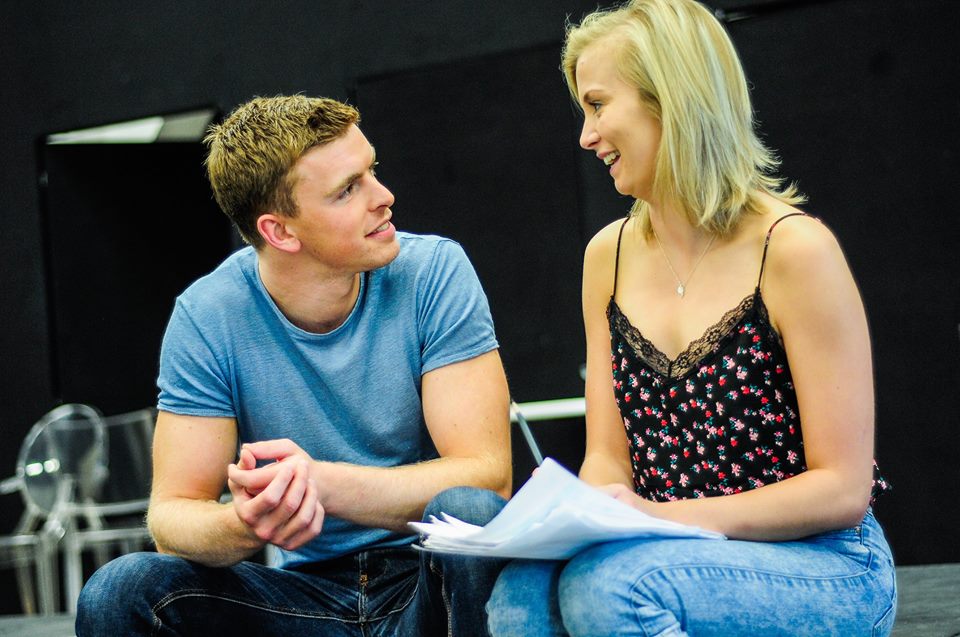
Chris Gordon and Sophie Melville, who play Romeo and Juliet.
On Thursday the 11th of September, I was invited to go and see a rehearsal of Romeo and Juliet at the Sherman Theatre Cymru, Cardiff. In my lifetime I’ve seen countless Romeo and Juliet productions, each one trying to bring their own stamp towards it. While some ideas work well, some productions were trying to hard to be unique therefore taking away the real essence of what the play was about. I was nervous and excited when entering the rehearsal space, as the company was only two weeks out of six into their rehearsal process. I believe it takes many months to master any Shakespearian play and the fact they’ve been given six is quite risky. Rachel O’Riordan, directing this production gave us an insight into her mind, showing us a snippet of how she will take on one of Shakespeare’s most famous plays.
The first scene we watched was Act 2 Scene 4 where the Nurse looks for Romeo in order to gain some confidence with him in terms of marrying Juliet. This whole scene is already filled with moments of hilarity and great characterisation. The relationship between the actors on stage and off is a delight to see. The atmosphere is filled with driven energy, so much lightheartedness and fun. Rachel provides a great working space for her actors so they can experiment on how they can expand their acting skills.
The second scene we saw was a complete contrast to the first. This scene, Act 3 Scene 3 is where Romeo is talking to Friar Lawrence and finding out he’s banished from Verona. The company ran through the scene once and then sat down with Rachel in the middle of them exploring every single line, every word. They discussed what the line would mean in Shakespearian times and why it would seem unorthodox to say it now. Rachel directed this scene brilliantly and showed me a deeper insight into the mind of Romeo. The collaboration between experienced actors who have been in the industry for many years and actors who are just starting out was mesmerising. They bounced of each other, learned from each other and therefore made the work so much more engaging. Rachel’s experience as a director demonstrated that she knew just how to motivate and engage the actors in her company.
The only thing I would have liked to have seen is a scene with Juliet. Personally I detest this character and generally the way people perceive her to be. I’ve often seen the character played to be whiny and just completely annoying. In the Q&A session I asked Rachel how she would direct the portrayal of Juliet in the production. It seemed to me that Rachel also shared some of my reservations of the representation of the character of Juliet on stage. When I asked Rachel she agreed that Juliet is a strong character and shouldn’t be played down. It’ll be interesting to see how Sophie Melville, playing this character will interpret this role.
Overall through this insight into the rehearsal process it is clear Rachel has spent a great deal of time trying to figure out exactly how she wants to create her directorial vision of Romeo and Juliet. I’m excited to see this production and you should be too. There are many great actors in this production and they all bring their own personal edge to the characters we know. Rachel O’Riordan has great directing skills and I have a lot of faith that she will do this play justice.
Romeo and Juliet plays at the Sherman Theatre Cardiff on the 2-18 of October.
http://www.shermancymru.co.uk/performance/literature/romeo-juliet/
An insight into the rehearsal process of Sherman Cymru’s Romeo and Juliet by Kaitlin Wray

Chris Gordon and Sophie Melville, who play Romeo and Juliet.
On Thursday the 11th of September, I was invited to go and see a rehearsal of Romeo and Juliet at the Sherman Theatre Cymru, Cardiff. In my lifetime I’ve seen countless Romeo and Juliet productions, each one trying to bring their own stamp towards it. While some ideas work well, some productions were trying to hard to be unique therefore taking away the real essence of what the play was about. I was nervous and excited when entering the rehearsal space, as the company was only two weeks out of six into their rehearsal process. I believe it takes many months to master any Shakespearian play and the fact they’ve been given six is quite risky. Rachel O’Riordan, directing this production gave us an insight into her mind, showing us a snippet of how she will take on one of Shakespeare’s most famous plays.
The first scene we watched was Act 2 Scene 4 where the Nurse looks for Romeo in order to gain some confidence with him in terms of marrying Juliet. This whole scene is already filled with moments of hilarity and great characterisation. The relationship between the actors on stage and off is a delight to see. The atmosphere is filled with driven energy, so much lightheartedness and fun. Rachel provides a great working space for her actors so they can experiment on how they can expand their acting skills.
The second scene we saw was a complete contrast to the first. This scene, Act 3 Scene 3 is where Romeo is talking to Friar Lawrence and finding out he’s banished from Verona. The company ran through the scene once and then sat down with Rachel in the middle of them exploring every single line, every word. They discussed what the line would mean in Shakespearian times and why it would seem unorthodox to say it now. Rachel directed this scene brilliantly and showed me a deeper insight into the mind of Romeo. The collaboration between experienced actors who have been in the industry for many years and actors who are just starting out was mesmerising. They bounced of each other, learned from each other and therefore made the work so much more engaging. Rachel’s experience as a director demonstrated that she knew just how to motivate and engage the actors in her company.
The only thing I would have liked to have seen is a scene with Juliet. Personally I detest this character and generally the way people perceive her to be. I’ve often seen the character played to be whiny and just completely annoying. In the Q&A session I asked Rachel how she would direct the portrayal of Juliet in the production. It seemed to me that Rachel also shared some of my reservations of the representation of the character of Juliet on stage. When I asked Rachel she agreed that Juliet is a strong character and shouldn’t be played down. It’ll be interesting to see how Sophie Melville, playing this character will interpret this role.
Overall through this insight into the rehearsal process it is clear Rachel has spent a great deal of time trying to figure out exactly how she wants to create her directorial vision of Romeo and Juliet. I’m excited to see this production and you should be too. There are many great actors in this production and they all bring their own personal edge to the characters we know. Rachel O’Riordan has great directing skills and I have a lot of faith that she will do this play justice.
Romeo and Juliet plays at the Sherman Theatre Cardiff on the 2-18 of October.
http://www.shermancymru.co.uk/performance/literature/romeo-juliet/
PREVIEW: ‘Crazy Gary’s Mobile Disco’ by Gary Owen – Waking Exploits
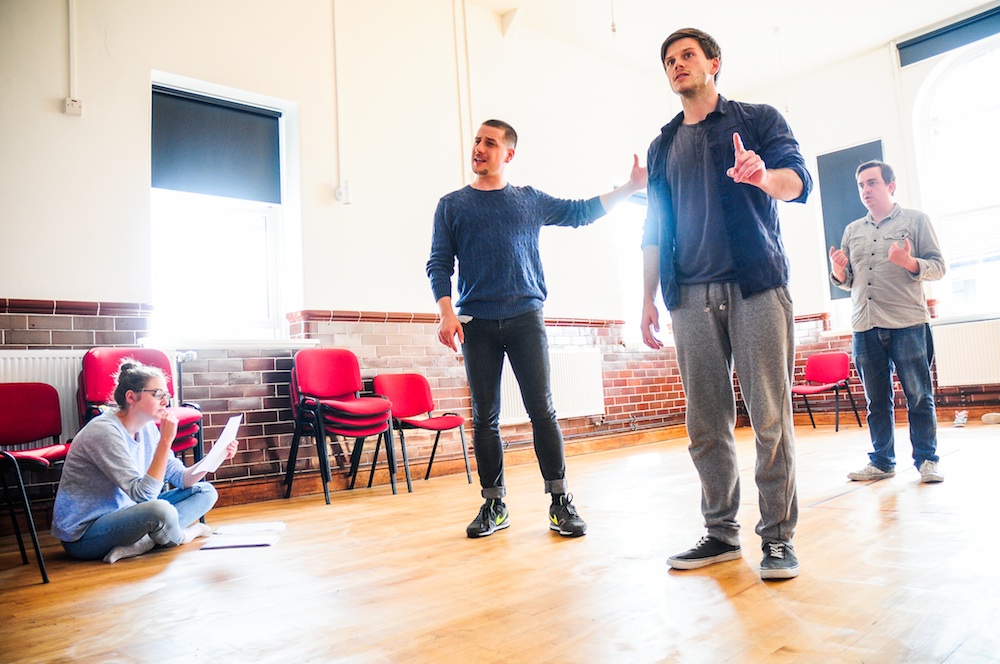
Pictures by Kirsten McTernan
Described by Guardian critic Michael Billington as ‘a startling debut that spluttered and fizzed like an out-of-control firework’, Crazy Gary’s Mobile Disco starts its Welsh tour this week at Chapter in a revival by Waking Exploits. Chapter – famed for showcasing new works alongside old – is the venue where Gary Owen’s stage debut made its first appearance in February 2001. Since then, Owen has found much success as a playwright, now writing for Sherman Cymru, National Theatre Wales and the Royal Court, establishing himself as one of Wales’ most daring and definitive literary voices. This production, however, will bring the play and its writer back to their roots; back home, where they belong.
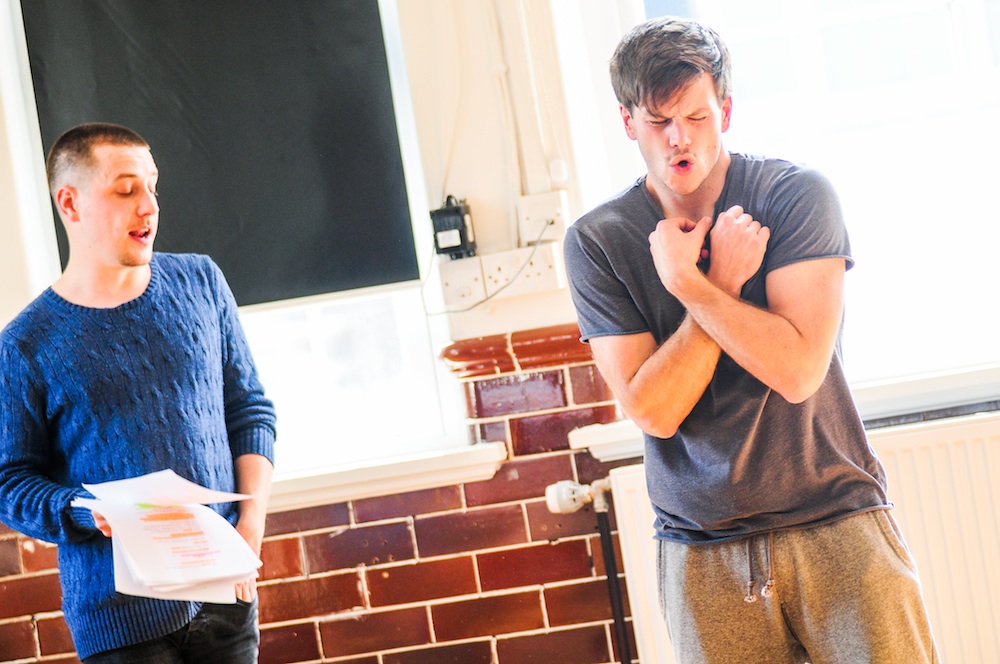
The play, set in small town Wales on a night out, concerns three very different but similarly flawed men whose masculinity is in crisis. Each one is desperate to shed those innate reputations that still haunt them from their schooldays – ‘the geek, the gimp and the bully.’ Owen essentially provides a voice for these men, unleashing a lifetime of frustration through a relentless tirade of visceral, abrasive monologues.
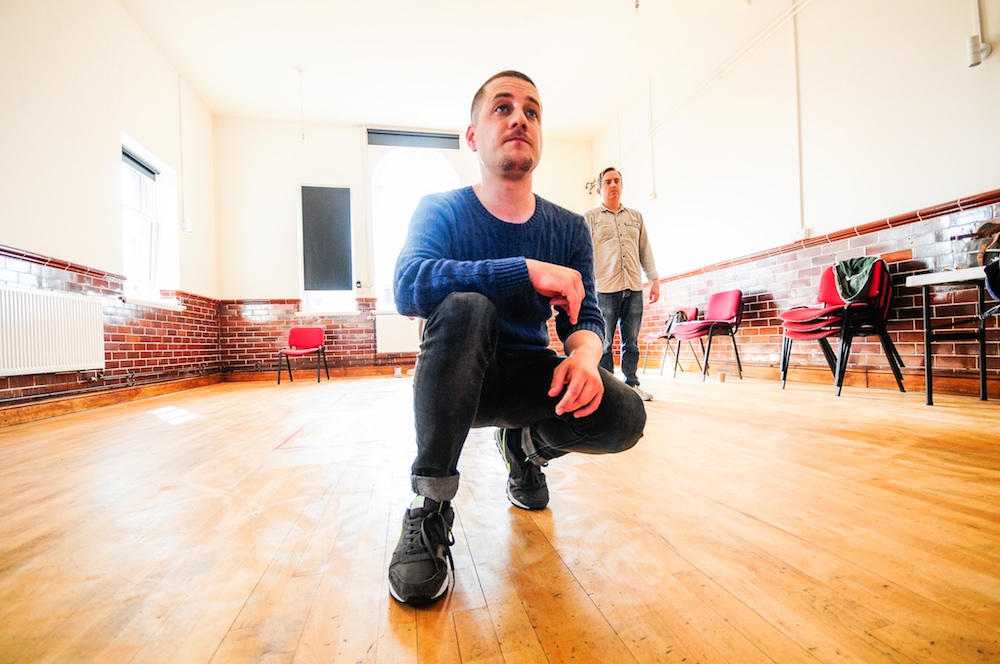
Waking Exploits have previously been lauded for their ground-breaking, innovative and ambitious projects, performing works by contemporary masters such as Caryl Churchill, Dennis Kelly and Simon Stephens. Also on board is director Matt Ball, formerly the two-year Creative Associate for National Theatre Wales and five-year Artistic Director for Camden People’s Theatre. Its cast will include Jordan Bernarde, Gwydion Rhys and Sion Pritchard. In other words, it is sure to be a good’un.
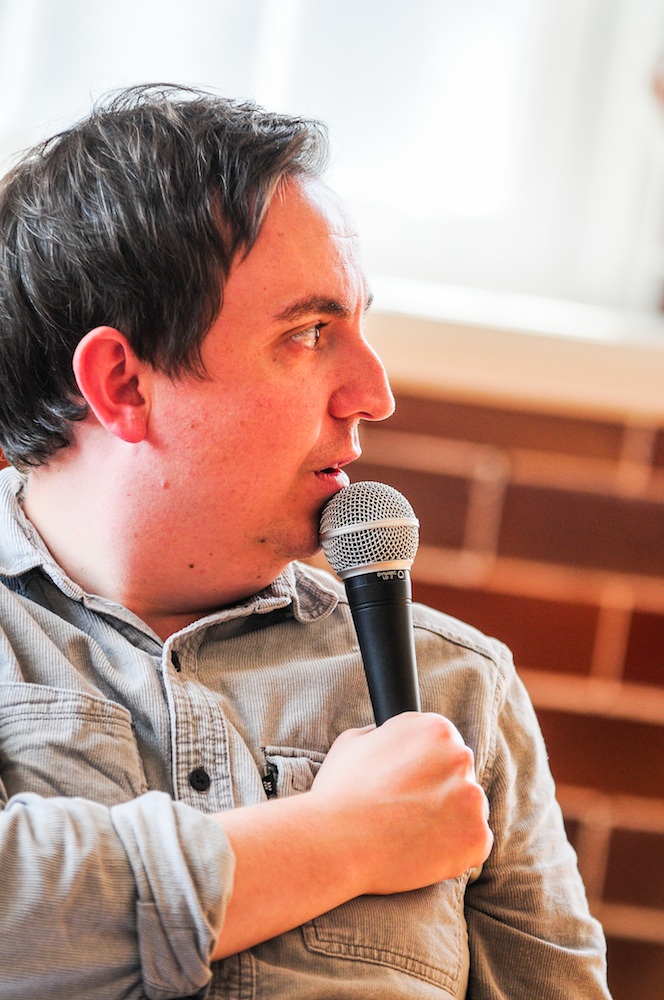
Gary Owen himself has said of the project, “It will be brilliant, but slightly weird, to see this play being done in Chapter again. It’s been done loads – every year, there are a couple of productions somewhere in the world – but seeing the play that started my career, at the venue where it was first produced, is going to be a huge pleasure. And slightly unsettling.”
After picking up the library’s copy of the play, I am quite pleased to say that I devoured it in one sitting. Coupled with the expertise of the creative team behind it, I expect this production will do it the justice it deserves.
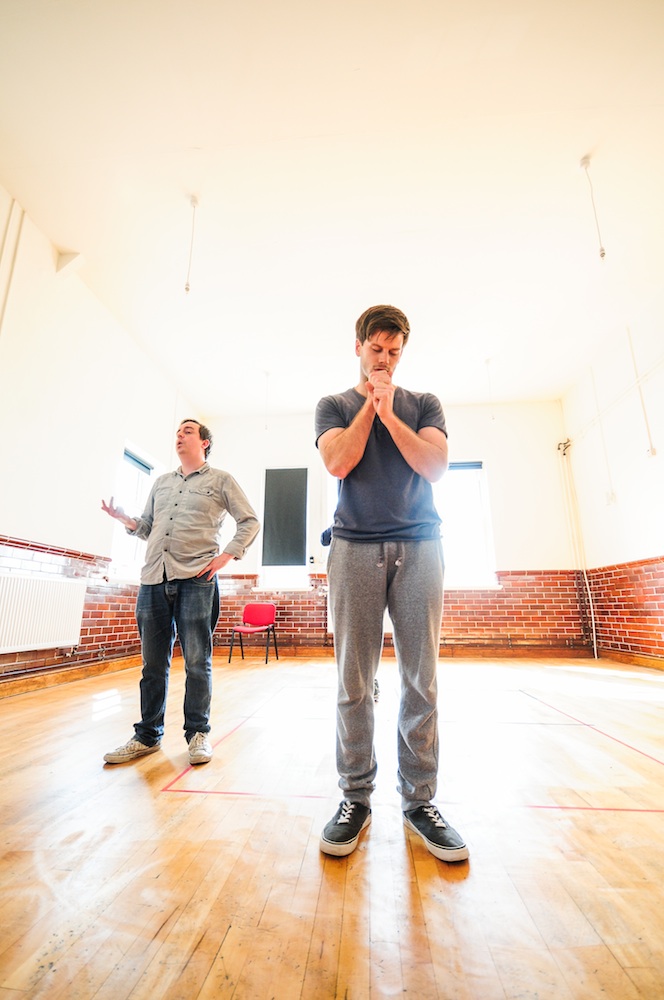
PREVIEW: ‘Crazy Gary’s Mobile Disco’ by Gary Owen – Waking Exploits by Sam Pryce

Pictures by Kirsten McTernan
Described by Guardian critic Michael Billington as ‘a startling debut that spluttered and fizzed like an out-of-control firework’, Crazy Gary’s Mobile Disco starts its Welsh tour this week at Chapter in a revival by Waking Exploits. Chapter – famed for showcasing new works alongside old – is the venue where Gary Owen’s stage debut made its first appearance in February 2001. Since then, Owen has found much success as a playwright, now writing for Sherman Cymru, National Theatre Wales and the Royal Court, establishing himself as one of Wales’ most daring and definitive literary voices. This production, however, will bring the play and its writer back to their roots; back home, where they belong.

The play, set in small town Wales on a night out, concerns three very different but similarly flawed men whose masculinity is in crisis. Each one is desperate to shed those innate reputations that still haunt them from their schooldays – ‘the geek, the gimp and the bully.’ Owen essentially provides a voice for these men, unleashing a lifetime of frustration through a relentless tirade of visceral, abrasive monologues.

Waking Exploits have previously been lauded for their ground-breaking, innovative and ambitious projects, performing works by contemporary masters such as Caryl Churchill, Dennis Kelly and Simon Stephens. Also on board is director Matt Ball, formerly the two-year Creative Associate for National Theatre Wales and five-year Artistic Director for Camden People’s Theatre. Its cast will include Jordan Bernarde, Gwydion Rhys and Sion Pritchard. In other words, it is sure to be a good’un.

Gary Owen himself has said of the project, “It will be brilliant, but slightly weird, to see this play being done in Chapter again. It’s been done loads – every year, there are a couple of productions somewhere in the world – but seeing the play that started my career, at the venue where it was first produced, is going to be a huge pleasure. And slightly unsettling.”
After picking up the library’s copy of the play, I am quite pleased to say that I devoured it in one sitting. Coupled with the expertise of the creative team behind it, I expect this production will do it the justice it deserves.

